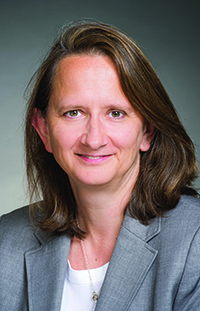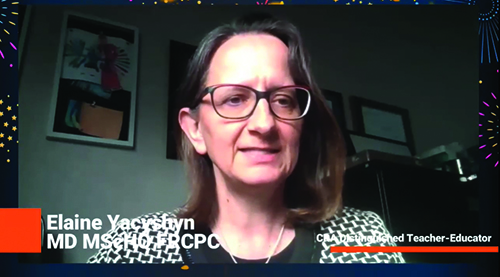Summer 2021 (Volume 31, Number 2)
The CRA’s 2021 Distinguished
Teacher-Educator:
Dr. Elaine Yacyshyn
Download PDF

What was your first thought when you
learned that you would receive this
award?
I was in the middle of clinic with a
resident and felt that it was amazing
to be teaching when I received the
notification. I was deeply honoured to
receive this award. It was a true privilege
to be recognized by my peers.
I was also very thankful to those who
nominated me, and to the many residents
and fellows who I have worked
with, as well as my colleagues locally
and nationally.
Can you recall a teacher in your own
past who inspired your direction into
education?
I have been very fortunate to have
had great teachers who both inspired
and encouraged me to become a clinician educator. My
most amazing teachers stand out because of the personal
connection they made with learners. I recall my kindergarten
teacher, who was the kindest woman, and shared
her cookies at recess. Numerous teachers through junior
high and high school spent time fostering curiosity in
their subject areas. At university, a chemistry professor was
on stage to congratulate me at convocation. I also recall
many gifted teachers in rheumatology who motivated me
to do my best and spent time talking with me and guiding
me to reach my fullest potential.
I have also been inspired by my learners who ask challenging
questions, and encourage me to work with them on
questions, and to push the envelope.
It was past and present teachers who showed kindness,
generosity and wisdom and helped me focus on education
in medicine.
What do you believe are the qualities of a good educator?
My philosophy is to ensure that all learners develop knowledge,
skills, and competency in medicine.
My main method of instruction is context-based learning.
I make use of opportunities to observe and interact,
to provide timely feedback, and to motivate for learning.
Students learn best as active learners. I see the role of a
teacher as a facilitator and mentor, not a supplier of knowledge.
I try to understand my students’ knowledge and,
through interaction, develop weaknesses into strengths.
I also believe in “physicianship”
(Cruess et al), which affirms that
physicians have roles as healers, professionals,
and teachers who can integrate
scientific and humanistic views
of medicine.1
Learners need regular assessments
and feedback. My aim has been to
teach and mentor to the best of my
ability. I believe it is important for me
to continue to challenge myself, and
I seek out opportunities to become a
better teacher.
As a rheumatology program director
at the University of Alberta, what
were some of the opportunities and
challenges you faced?
I was very fortunate to have been the
rheumatology program director at the
University of Alberta (UofA). This role enabled me to pursue
my role as a clinician-educator.
I had the opportunity to optimize the rheumatology residency
program at the UofA. I had the support of colleagues
who were equally passionate about education and
helped me to achieve these goals. As a program director I
was able to meet many of my Canadian counterparts. I was
inspired and encouraged by my colleagues and was able to
pursue educational efforts at a national level. The opportunity
to network with many amazing colleagues has been
very rewarding and enjoyable.
It was always a challenge to choose our residents for
the program, among all the great applicants. The qualifications
of our learners continue to impress me. It has been
gratifying to work with our residents and see them become
amazing colleagues in a very short time.
You’ve also been an examiner for the Royal College of
Physicians and Surgeons of Canada (RCPSC) Rheumatology
Examination and examination chair for two terms. Currently
you are a member of the RCPSC Examination Committee,
which oversees all Royal College examinations.
Are you working on any exciting changes right now that you
can share?
These are unprecedented times at the Royal College (RC)
as we are in the midst of the pandemic. It has been impressive
to see everyone work together to maintain the high standards of evaluations and concern for learners.
Over the last year, I have transitioned from Rheumatology
Examination Chair to the Royal College Examination Committee.
The Royal College examination boards continue to
work hard to prepare valid tools to assess competency in a
safe manner.
As a respected teacher-educator, what would your advice be
to a prospective rheumatologist?
If you are interested in a career that provides the opportunity
to see amazing patients, perform high-level research,
and be able to teach fantastic learners, you should consider
rheumatology! We are fortunate to have such rewarding
careers.
How many cups of coffee does it take to make a productive
day?
Most people who know me are aware that I do not drink
coffee. I like herbal tea, but my guilty pleasure is an almond
milk chai tea.
What is a hidden talent of yours that not many people know
about?
I really enjoy playing the piano; I used to play when I was
a child. I started taking lessons again a few years ago, and
love to play Chopin. I have also learnt from my piano teacher
how patient one needs to be as a teacher!
What would you be if you weren’t a rheumatologist?
I think I would be a teacher and, like my kindergarten teacher,
hand out Peak Frean cookies!

Dr. Yacyshyn receiving the CRA Distinguished Teacher-Educator Award during the virtual gala in February.
Reference:
1. Cruess RL, et al. Reframing medical education to support professional identity formation. Acad Med. 2014;
89(11):1446-51.
Elaine Yacyshyn, MD, FRCPC
Associate Professor and Rheumatologist,
Department of Medicine, Faculty of Medicine & Dentistry
University of Alberta,
Edmonton, Alberta
|
